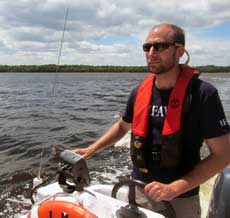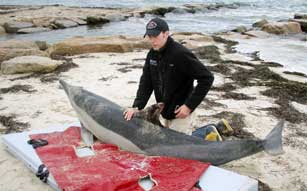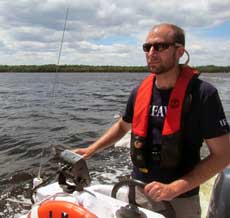 NARRAGANSETT, R.I. – April 23, 2015 – It’s not unusual for C.T. Harry to get calls from his office at any hour of the day or night. He has even been called in several times on Christmas Day. But he doesn’t regret it at all, because every call could be a life-or-death situation.
NARRAGANSETT, R.I. – April 23, 2015 – It’s not unusual for C.T. Harry to get calls from his office at any hour of the day or night. He has even been called in several times on Christmas Day. But he doesn’t regret it at all, because every call could be a life-or-death situation.
The Plymouth, Mass. resident helps lead the marine mammal stranding response team of the International Fund for Animal Welfare, coming to the aid of whales, seals, dolphins and porpoises that become stranded on beaches throughout Cape Cod and southeastern Massachusetts.
He is also a part-time student at the University of Rhode Island’s Graduate School of Oceanography, from which he will receive a master’s degree during commencement ceremonies May 16. The thesis he wrote for his degree mirrors the professional work he has been doing for the last dozen years.
“I wanted to take a step back from the health aspect of why animals strand and look at whether there were broader scale climatological or oceanographic correlations that could influence dolphin strandings on a longer-term scale,” he said.
 Harry analyzed the frequency of dolphin strandings in the Northeast and linked it to variations in the North Atlantic Oscillation, an atmospheric phenomenon that creates fluctuations in atmospheric pressure over the North Atlantic and affects weather patterns and oceanographic currents.
Harry analyzed the frequency of dolphin strandings in the Northeast and linked it to variations in the North Atlantic Oscillation, an atmospheric phenomenon that creates fluctuations in atmospheric pressure over the North Atlantic and affects weather patterns and oceanographic currents.
“It’s a big atmospheric driver that has been shown to influence the distribution and abundance of marine life,” Harry explained. “If the North Atlantic Oscillation can do that, then maybe it has something to do with shifting dolphin populations from offshore to inshore coastal waters where they then would have an increased risk of stranding.”
His research found that hypothesis to be true, though he speculates that the oscillation likely contributes to a redistribution of prey species that could determine whether dolphins remain offshore in deeper waters or near-shore in areas such as Cape Cod Bay.
A native of Suffolk, Va., Harry became interested in marine mammal strandings when working at the Virginia Aquarium and volunteering for its stranding program, which focused mostly on bottlenose dolphins and sea turtles. He spent four summers doing field research on sea turtle stranding mortality on the eastern shore of Virginia, racing around the barrier islands in a 15-foot Zodiac looking for beached turtles and trying to determine why they stranded. He eventually relocated to Cape Cod to continue this work.
“The beauty of this gig is that no two days are ever the same,” he said. ‘I could be analyzing data in the office one minute and get a call about a live dolphin stranded out at Wellfleet, and I just have to pick up and go.”
Despite his thesis results, Harry knows that marine mammals may strand for any number of reasons.
“The historic dogma about live stranded animals, especially dolphins, was that something was wrong with them, and the majority were euthanized,” he said. “And while a lot of animals do strand due to various health issues, we’re finding many that strand for factors unrelated to their health, like their navigational abilities may have been compromised.” And because dolphins are social animals, they could follow a sick or compromised animal right onto the beach.
Strandings may also be an indication that something is going wrong in the larger marine ecosystem. “Marine mammals are sentinel species. If we start seeing a lot of animals that wash ashore showing signs of similar pathologies, then that may be an indication that something bigger is wrong in their environment,” he said.
After taking five years to complete his master’s degree, taking one class at a time, Harry is taking some time to think about his future.
“This degree is a big milestone for me, both personally and professionally,” he said, “but I don’t expect it to lead to any life-altering career changes. But down the road I may want to explore some of the policy angles that have conservation implications.
“With offshore wind farms and offshore oil and gas exploration, industry and government are going to need someone who understands marine mammal population dynamics. And I would love to be the guy to be the bridge between the science and policymakers.”

